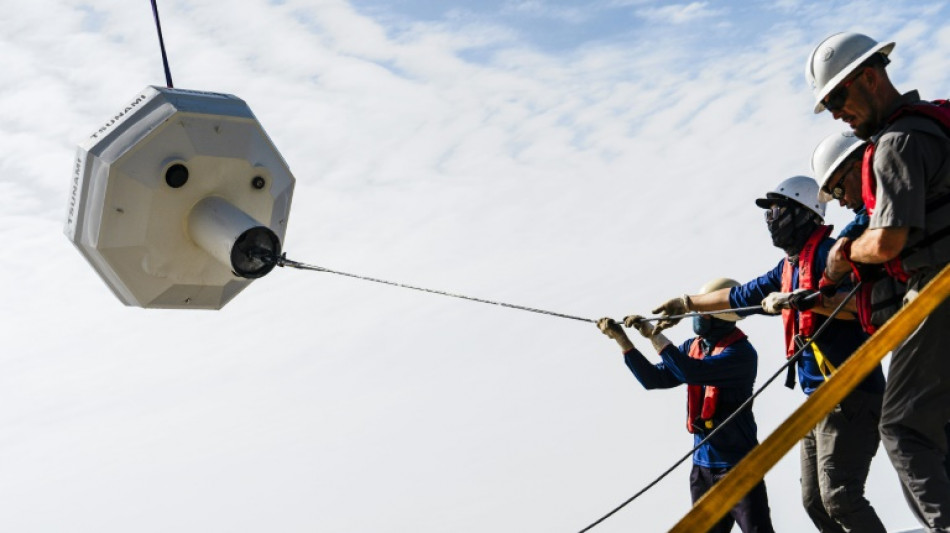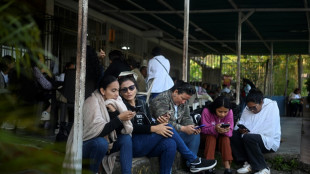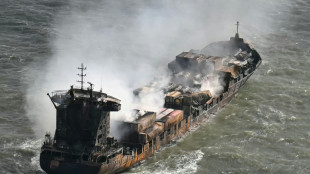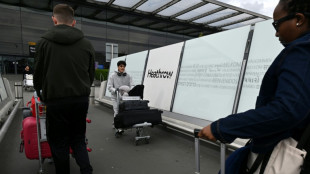
-
 Scientists reveal what drives homosexual behaviour in primates
Scientists reveal what drives homosexual behaviour in primates
-
Venezuela releases more political prisoners as pressure builds

-
 15,000 NY nurses stage largest-ever strike over conditions
15,000 NY nurses stage largest-ever strike over conditions
-
Rosenior plots long Chelsea stay as Arsenal loom

-
 Zuckerberg names banker, ex-Trump advisor as Meta president
Zuckerberg names banker, ex-Trump advisor as Meta president
-
Reza Pahlavi: Iran's ex-crown prince dreaming of homecoming

-
 Venezuela releases more political prisoners
Venezuela releases more political prisoners
-
Kenya's NY marathon champ Albert Korir gets drug suspension

-
 US prosecutors open probe of Fed chief, escalating Trump-Powell clash
US prosecutors open probe of Fed chief, escalating Trump-Powell clash
-
Russian captain in fiery North Sea crash faces UK trial

-
 Carrick is frontrunner for interim Man Utd job: reports
Carrick is frontrunner for interim Man Utd job: reports
-
Iran government stages mass rallies as alarm grows over protest toll

-
 Variawa leads South African charge over Dakar dunes
Variawa leads South African charge over Dakar dunes
-
Swiss inferno bar owner detained for three months

-
 Heathrow airport sees record high annual passenger numbers
Heathrow airport sees record high annual passenger numbers
-
Georgia jails ex-PM for five years amid ruling party oustings

-
 Kyiv buries medic killed in Russian drone strike
Kyiv buries medic killed in Russian drone strike
-
Israel revokes French researcher's travel permit

-
 India and Germany seek to boost defence industry ties
India and Germany seek to boost defence industry ties
-
French coach and football pundit Rolland Courbis dies at 72

-
 UK regulator opens probe into X over sexualised AI imagery
UK regulator opens probe into X over sexualised AI imagery
-
AFCON organisers investigate incidents after Algeria-Nigeria clash

-
 US Fed chief warns of 'intimidation' after criminal subpoenas
US Fed chief warns of 'intimidation' after criminal subpoenas
-
Gold hits record high, dollar falls as US targets Fed

-
 Iran says 'prepared for war' as alarm grows over protest toll
Iran says 'prepared for war' as alarm grows over protest toll
-
India and Germany eye defence industry boost to ties

-
 'I know the pain': ex-refugee takes over as UNHCR chief
'I know the pain': ex-refugee takes over as UNHCR chief
-
US prosecutors open criminal probe into Federal Reserve

-
 Rohingya 'targeted for destruction' by Myanmar, ICJ hears
Rohingya 'targeted for destruction' by Myanmar, ICJ hears
-
'Genius' chimpanzee Ai dies in Japan at 49

-
 Trump says US will take Greenland 'one way or the other'
Trump says US will take Greenland 'one way or the other'
-
Asian equities, precious metals surge as US Justice Dept targets Fed

-
 Myanmar pro-military party claims Suu Kyi's seat in junta-run poll
Myanmar pro-military party claims Suu Kyi's seat in junta-run poll
-
Fed chair Powell says targeted by federal probe

-
 Trailblazing Milos Raonic retires from tennis
Trailblazing Milos Raonic retires from tennis
-
Australia recalls parliament early to pass hate speech, gun laws

-
 'One Battle After Another,' 'Hamnet' triumph at Golden Globes
'One Battle After Another,' 'Hamnet' triumph at Golden Globes
-
Japan aims to dig deep-sea rare earths to reduce China dependence

-
 Top UN court to hear Rohingya genocide case against Myanmar
Top UN court to hear Rohingya genocide case against Myanmar
-
US sends more agents to Minneapolis despite furor over woman's killing

-
 Trump says Iran 'want to negotiate' after reports of hundreds killed in protests
Trump says Iran 'want to negotiate' after reports of hundreds killed in protests
-
Bangladesh's powerful Islamists prepare for elections

-
 NBA-best Thunder beat the Heat as T-Wolves edge Spurs
NBA-best Thunder beat the Heat as T-Wolves edge Spurs
-
Ukraine's Kostyuk defends 'conscious choice' to speak out about war

-
 Trump says working well with Venezuela's new leaders, open to meeting
Trump says working well with Venezuela's new leaders, open to meeting
-
Asian equities edge up, dollar slides as US Fed Reserve subpoenaed

-
 Hong Kong court hears sentencing arguments for Jimmy Lai
Hong Kong court hears sentencing arguments for Jimmy Lai
-
Powell says Federal Reserve subpoenaed by US Justice Department

-
 Chalamet, 'One Battle' among winners at Golden Globes
Chalamet, 'One Battle' among winners at Golden Globes
-
Turning point? Canada's tumultuous relationship with China


The tsunami detection buoys safeguarding lives in Thailand
Almost 1,000 kilometres off the Thai coast devastated by a tsunami 20 years ago, engineers lower a detection buoy into the waves -- a key link in a warning system intended to ensure no disaster is as deadly again.
On December 26, 2004, a magnitude 9.1 earthquake under the Indian Ocean triggered a huge tsunami with waves up to 30 metres (100 feet) high.
Only a rudimentary warning system was in place at the time, with no way to alert the millions of people living around the Indian Ocean in advance. More than 225,000 people were killed in a dozen countries.
In the years following the disaster, multiple governments developed a global tsunami information system, building on the US National Oceanic and Atmospheric Administration's (NOAA) network of six detection buoys in the Pacific.
Known as Deep-Ocean Assessment and Reporting of Tsunamis (DART), the system now has 74 buoys around the world.
Each floats on the surface while tethered to the seabed, monitoring signals from a seismic sensor on the ocean floor and changes in the water level.
Installed in some of the toughest working environments anywhere on the planet, the battery-powered buoys must be replaced every two years. Only 50 of the devices are currently operational but the network has been designed to provide coverage regardless.
The Thai research vessel M.V. SEAFDEC crew gently lowered a replacement buoy -- a yellow cylinder about two metres in diameter -- this month into the Indian Ocean 965 kilometres (600 miles) offshore.
- Five-minute warning -
The same team also sought to replace a closer buoy in the Andaman Sea, 340 kilometres from the coast, but were unsuccessful and will mount a new mission in the coming weeks.
Shawn Stoeckley, a mechanical engineer from buoy manufacturers Science Applications International Corporation (SAIC), calibrates the system from his laptop on board before it is deployed.
"I feel that it has a lot of purpose, that it can save coastal lives," he told AFP.
The 2004 tsunami killed more than 5,000 people in Thailand, according to official figures, with 3,000 missing.
Now the country's two DART buoys are linked by satellite to a nationwide network of 130 alarm towers equipped with sirens and loudspeakers that can broadcast in five languages in coastal provinces.
Residents in disaster-prone areas also receive an SMS alert of an imminent tsunami, warning them to evacuate quickly.
Before 2004, it would take anywhere from 15 to 50 minutes before an alarm could be issued, says Laura Kong, director of UNESCO's International Tsunami Information Center.
"Today it's typical we would get something within five to seven minutes," she said.
One day, say UN experts, the system will prove essential.
There is a "100 percent chance" of another tsunami on the scale of 2004 at some point, Bernardo Aliaga, UNESCO's head of Tsunami Resilience Section, told an anniversary conference, adding it "could be tomorrow or in 50 years or 100 years".
- False alarms -
Mobile phones have become ubiquitous and disaster apps widely available in the years since the tsunami, but locals say the towers are still vital.
Songsil Nodharith, 51, head of Khuek Khak village, helped residents to evacuate "without even grabbing their belongings" during a night-time false alarm last year and urged authorities to ensure that the towers were well maintained.
In Sri Lanka -- where 31,000 were killed in 2004, making it the second-worst-hit country -- more than three-quarters of the 77 tsunami warning towers the government subsequently installed are not operating because the communications equipment has become obsolete, the island's Disaster Management Centre chief Udaya Herath told AFP.
Mobile phone companies have instead identified some 70,000 "key contacts" in coastal areas, including resort managers, to receive warnings and evacuation orders in the event of impending danger.
Warnings have occasionally set off panic in Thailand, with locals and tourists rushing for higher ground, but residents have faith in the system.
The fishing village of Ban Nam Khem saw Thailand's worst destruction in 2004, with trawlers swept onto houses and 800 residents killed.
Manasak Yuankaew, 48, now head of the village, lost four members of his family that day.
"We have a saying here," he told AFP. "Fleeing 100 times is better than not fleeing that one crucial time."
H.Darwish--SF-PST



